Posts Tagged ‘books’
Sunday, August 7th, 2022
Anyone can write but editing must be learned. Some books that helped me learn to edit:
Self Editing For Fiction Writers by Renni Browne and Dave King teaches style, dialogue, point of view, ‘show not tell’, character.
The Art of Writing by John Gardner talks about maintaining the ‘dream’ of the story – when the writing draws attention to itself (in a bad way) then the dream is broken for the reader.
Go over and over it…refusing to let anything stay if it looks awkward, phony, or forced.– John Gardner
On Becoming a Writer by Dorothea Brande (1934) suggests a writer begins with the unconscious mind ‘but then the conscious mind ‘must control, combine and discriminate’. That’s editing in a nutshell.
The writer must be as God in his universe — present everywhere and visible nowhere. -Flaubert
Tags: books, editing, writing
Posted in Book Reviews, Writing | No Comments »
Sunday, July 10th, 2022
“The idea of the extraordinary happening in the context of the ordinary is what’s fascinating to me.” – Chris van Allsburg
Picture books by Chris van Allsburg are not only beautifully illustrated, the stories are wide open for wide interpretation, which makes them ideal for children. It’s impossible to look at the pictures in Harris Burdick without imagining a story. My other surreal favourites are Bad Day at Riverbend, about a black and white cowboy town attacked by colourful crayons – and The Wretched Stone, about a strange glowing stone which makes the people regress intellectually (TV and digital screens perhaps?).
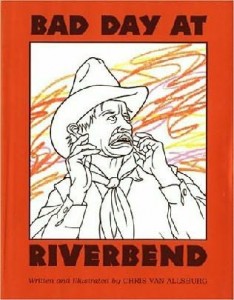
Tags: books, children's books, picture books, reviews
Posted in Book Reviews, Children's Books | No Comments »
Sunday, March 27th, 2022
Perhaps it is only in childhood that books have any deep influence on our lives. – Graham Greene
In a world that offers children so many digital delights, why bother with books?
1. Books help children understand the world
Books expose children to new ideas and help shape their world view – reading is a meeting of minds.
While reading, we can leave our own consciousness, and pass over into the consciousness of another person, another age, another culture – Maryanne Wolf
2. Books help children understand themselves
Stories give a frame of reference by which they can measure their experiences and feelings.
We read books to find out who we are. – Ursula K Le Guin
3. Books develop children’s imagination
Reading is imagination, and imagination enriches the real world.
Children do not despise real woods because they have read of enchanted woods; the reading makes all woods a little enchanted. – C.S. Lewis
4. Books develop children’s brains
Books boost a child’s intellectual development. The brain changes when children learn to read: it creates new neural pathways….reading and thinking enhance each other.
5. Books are enjoyable.
Ultimately a child must want to read. The child who reads for pleasure is forming a wonderful habit – and there’s also pleasure for parents in reading aloud.
See also: Guide To Best Books For Children
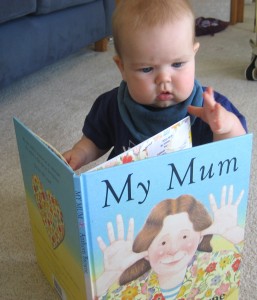
Tags: books, children's books, Reading, science
Posted in Children's Books, Reading, Science | No Comments »
Thursday, March 11th, 2021
Fiction should be both canny and uncanny. – Flannery O’Connor
One of my favourite short stories is Flannery O’Connor’s A Good Man Is Hard To Find – it certainly has a powerful ending. Her stories can be dark but there’s always a redemptive thread in them. O’Connor wrote despite the pain of lupus which ended her life at the age of 39. Here are some of her thoughts about the writing process (from Mystery and Manners):
If you want to write well and live well at the same time, you’d better arrange to inherit money.
When I sit down to write, a monstrous reader looms up who sits down beside me and continually mutters, ‘I don’t get it, I don’t see it, I don’t want it.’
Fiction is about everything human and we are made of dust, and if you scorn getting dusty, then you shouldn’t write fiction.
There’s a certain grain of stupidity that the fiction writer can hardly do without and this is the quality of having to stare, of not getting to the point at once.
The artist uses her reason to discover an answering reason in everything she sees.
The writer has to judge himself with a stranger’s eye and a stranger’s severity.
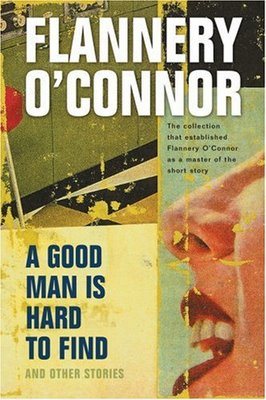
Tags: books, reviews, writers
Posted in Book Reviews, Writing | No Comments »
Wednesday, October 28th, 2020
Writing requires four fundamental steps:
Imagine: ‘Open your mind’ (P.D. James)
Write: ‘Put one word after another’ (Neil Gaiman)
Edit: ‘Omit needless words’ (William Strunk)
Hope: ‘Outrun the self-doubt’ (Stephen King)
The steps of writing harmonise with the four fundamental forces of the physical world:
Electromagnetism: has infinite range, like imagination,
Weak Force: is confined to the atoms, as a writer must be confined to work.
Strong Force: holds nuclei together, as editing strengthens writing.
Gravity: keeps us anchored and has infinite range, like hope.
Read my essay, The Science of Writing.
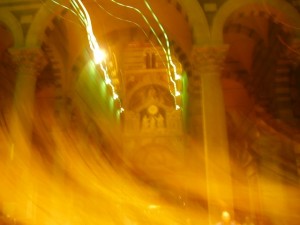
Tags: books, connections, science, writing
Posted in Science, Universe, Writing | No Comments »
Sunday, July 26th, 2020
When truly present in nature, we use all our senses at the same time, which is the optimum state of learning. ― Richard Louv, The Nature Principle
Direct exposure to the natural world is essential for healthy childhood development. Forest schools are springing up all over the world to give children outdoor experiences. I’m a trustee for a new Nature School (in Dunedin, New Zealand) which combines creative play with skill-teaching (bushcraft, beekeeping etc).
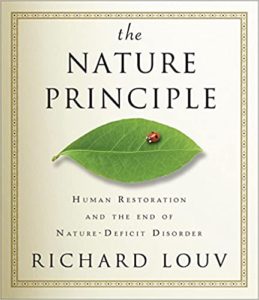
Tags: books, connections, reviews
Posted in Book Reviews | No Comments »
Saturday, February 1st, 2020
There is only one time that is important: Now. – Tolstoy
The wisdom in Tolstoy’s Twenty-Three Tales (1903) always inspires me. These classic folk tales include: How Much Land Does a Man Need? (very little, it turns out); The Three Questions (eg. What should I do with my time?); and A Grain as Big as a Hen’s Egg (the power of organic gardening).
Photo (1908): Tolstoy aged 80
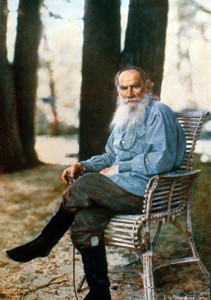
Tags: books, reviews, short stories, Tolstoy
Posted in Book Reviews | No Comments »
Saturday, August 3rd, 2019
Twenty-Three Tales by Tolstoy
There is only one time that is important – Now! It is the most important time because it is the only time when we have any power.
Moominpappa at Sea by Tove Jansson
Moominpappa had no idea what to do with himself, because it seemed everything there was to be done had already been done.
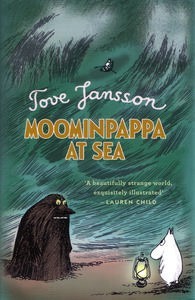
The Wisdom of Insecurity by Alan Watts
If the universe is meaningless, so is the statement that it is so.
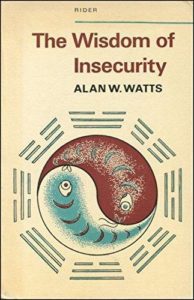
Right Ho, Jeeves by P.G. Wodehouse
I wouldn’t have said off-hand that I had a subconscious mind, but I suppose I must without knowing it, and no doubt it was there, sweating away diligently at the old stand, all the while the corporeal Wooster was getting his eight hours.
The Golden Apples of the Sun by Ray Bradbury
And pluck till time and times are done
The silver apples of the moon,
The golden apples of the sun.
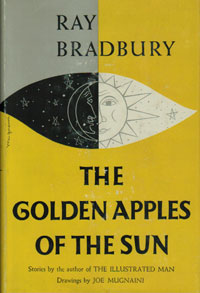
Tags: books, Ray Bradbury, reviews, Tolstoy
Posted in Book Reviews, Reading | 2 Comments »
Wednesday, October 31st, 2018
No one would have believed in the last years of the nineteenth century that this world was being watched…
So begins The War of the Worlds by H.G. Wells, but some did believe it 80 years ago on Halloween in 1938. Orson Welles’ fake news report based on the 1898 novel tricked many people into thinking it was a real invasion, if not by the Martians then by the Germans. The radio broadcast was scarily realistic (listen to a clip here). The 120 year old novel is hugely influential in giving the world extraterrestrial consciousness and opening narrative wells that produced countless sci-fi stories (although it does have a few racist attitudes of its time). H.G.Wells once met Orson Welles in this interview.
Picture by Alvim Corréa, 1906 edition.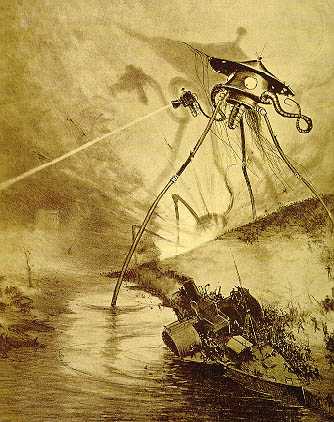
Tags: books, science fiction
Posted in Sci-Fi | No Comments »
Saturday, August 4th, 2018
Iona and Peter Opie were like the Brothers’ Grimm of the 1950s. Their fabulous book was The Lore and Language of Schoolchildren, an epic collection of children’s rhymes, riddles, superstitions, jeers, and customs, garnered from interviews with thousands of English children in the 1950s. Many of these rhymes and tricks persist in the playground today. Here are some gems from the Opie’s collection:
Pinch-me, Punch-me, and Steponmytoes,
Went down to the river to swim,
Two of the three were drowned,
Who do you think was saved?
Old Mr Kelly,
Had a pimple on his belly;
His wife cut it off,
It tasted like jelly.
When the war is over Hitler will be dead,
He hopes to go to heaven with a crown upon his head.
But the Lord said, No! You’ll have to go below,
There’s only room for Churchill, so cheery, cheery oh.
God made the bees
The bees make the honey;
We do the work,
The teacher gets the money.
Scab and matter custard,
Green snot pies,
Dead dog’s giblets
Dead cat’s eyes.
Hard boiled snails, Spread it thick
Wash it down with a cup of cold sick!
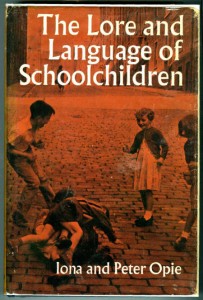
Tags: books, Grimm, poetry, reviews
Posted in Book Reviews, Children's Books | No Comments »
Sunday, July 8th, 2018
It’s really, really heartbreaking. But for some reason you want to read it again and again. It’s an extraordinary love story.– Michael Morpurgo
Almost every Sunday morning as a child I’d listen to Oscar Wilde’s short story, The Happy Prince (1888), on the radio and cry into my pillow so my brother nearby wouldn’t hear. A statue being stripped of his gold to feed the poor seems an unlikely plot for children. I didn’t understand all of Wilde’s lyrical language back then but the story shaped my values concerning wealth, poverty, and authority figures:
“The living always think that gold can make them happy.”
Listen to that radio version read by Robert Morley.
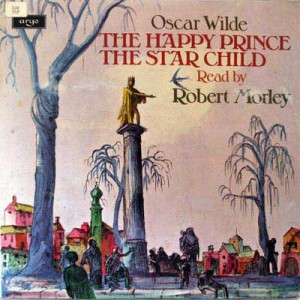
Tags: books, children's books, oscar wilde, reviews
Posted in Book Reviews, Children's Books | No Comments »
Saturday, June 9th, 2018
That touch of reality in a child’s life is a child’s comfort. The child gets the sense that this person who wrote this book knows about me and knows the world can be a troubling, incomprehensible place. Maurice Sendak
Outside Over There is my favourite Maurice Sendak picture book – – nobody else combined the real and the unreal so well. It’s a tale of separation and siblings (that features a creepy ice baby) and is both haunting and comforting. 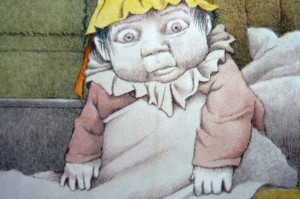
Sendak’s books can be exuberant (In the Night Kitchen), spiritual (Dear Mili), and funny (Pierre, a cautionary tale). I like his vision of atoms dancing to form molecules from the first book he illustrated (when 19 years old), Atomics for the Millions:
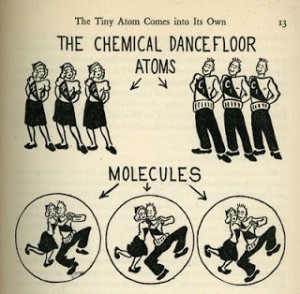
Tags: books, children's books, picture books, reviews
Posted in Book Reviews, Children's Books, Writing | 1 Comment »
Sunday, January 7th, 2018
Books are sensory – they have a pleasing look, a comforting smell, a grainy feel, a satisfying weight. You can lend a book, read it everywhere, stow it anywhere, hide treasures in it. The best-loved books are dog-eared, coffee-stained, and inscribed: carrying memories locked into untold brain networks by all the experiences you had when reading it.
And forever after you have only to open that book to be back where you first read it. It will all come into your mind with the very first words…― Cornelia Funke (Inkheart)
A book works at my speed, comfortable and slow, faster when I want it to be, then slow again. Many of my books are old friends.– Jack Lasenby (interview here).
When you read a great book, you don’t escape from life, you plunge deeper into it….And for this serious task of imaginative discovery and self-discovery, there is and remains one perfect symbol: the printed book.– Julian Barnes
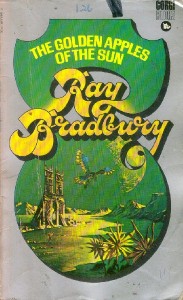
Tags: books, children's books, Reading, writers
Posted in Children's Books, Reading | 7 Comments »
Sunday, October 1st, 2017
Reading a book leaves us with new neural pathways. Gail Rebuck (Humans Have the Need To Read)
Reading can be learned only because of the brain’s plastic design, and when reading takes place, that individual brain is forever changed. Maryanne Wolf
Readers mentally simulate each new situation encountered in a narrative… using brain regions that closely mirror those involved when people perform, imagine, or observe similar real-world activities. Washington University
We already knew that good stories can put you in someone else’s shoes in a figurative sense. Now we’re seeing that something may also be happening biologically. – Gregory Berns (Emory University)

Photo: My grandson, Spencer, 5 months old
Tags: books, brain, Reading, science
Posted in Reading, Science | No Comments »
Sunday, February 5th, 2017
Thoughts from The Importance of Living (1938) by Lin Yutang, Chinese philosopher and inventor.
On writers:
Every word has a life and a personality. A writer always has an instinctive interest in words.
Writing is but the expression of one’s own nature or character… style is not a method, a system or even a decoration; it is but the total impression that the reader gets of the quality of the writer’s mind.
A writer in the ‘familiar’ style speaks in an unbuttoned mood. He completely exposes his weaknesses, and is therefore disarming.
A literary masterpiece is like a stretch of nature itself, well-formed in its formlessness…
On readers:
The ancient peoples called books ‘limp volumes’ and ‘soft volumes’; therefore the best style of reading a book is the leisurely style. In this mood, one develops patience for everything.
I regard the discovery of one’s favourite author as the most critical event in one’s intellectual development. Like a man falling in love with his sweetheart at first sight, everything is right…
A good reader turns an author inside out, like a beggar turning his coat inside out in search of fleas… an itch is a great thing.
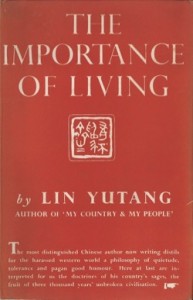
Tags: books, Reading, writing
Posted in Book Reviews, Reading, Writing | No Comments »
Thursday, December 10th, 2015
We should not write them off as superstitious primitives.– James Hannam
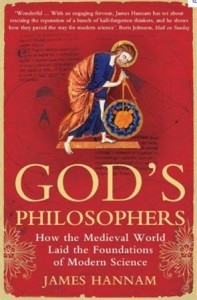 It’s a myth (turned cliche) that science and faith have always been at odds. The book, God’s Philosophers: How the Medieval World Laid the Foundations of Modern Science by James Hannam, shows how the church supported the genesis of science. Medieval universities were church-sponsored and ‘natural philosophy’ (as science was called back then) was a core subject. European thinkers drew on ancient Greek and Islamic texts to develop scientific principles that we still use today. Hannam debunks the myth of the ‘Dark Ages’: for example, people knew the Earth was round; the Christian church did not routinely persecute scientists; there were many inventions, from clocks to spectacles; and early Islamic scientists discovered how the eye functions and invented surgical instruments. (Essay on Science and Soul).
It’s a myth (turned cliche) that science and faith have always been at odds. The book, God’s Philosophers: How the Medieval World Laid the Foundations of Modern Science by James Hannam, shows how the church supported the genesis of science. Medieval universities were church-sponsored and ‘natural philosophy’ (as science was called back then) was a core subject. European thinkers drew on ancient Greek and Islamic texts to develop scientific principles that we still use today. Hannam debunks the myth of the ‘Dark Ages’: for example, people knew the Earth was round; the Christian church did not routinely persecute scientists; there were many inventions, from clocks to spectacles; and early Islamic scientists discovered how the eye functions and invented surgical instruments. (Essay on Science and Soul).
Tags: books, reviews, science
Posted in Book Reviews, Science | No Comments »
Saturday, October 3rd, 2015
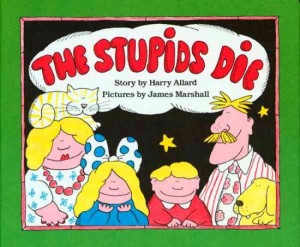
Choosing a title is the fun stage of writing a book. The hard work over, I spend hours happily test-driving pithy, bizarre or lyrical titles. The greatest children’s titles describe some aspect of the plot, setting, or character, in striking words. My favourites titles are A Swiftly Tilting Planet and The Stupid’s Die; and I quite like my own, Global Norman (about global warming). Here are some classic titles of children’s literature:
* Character: Oliver Twist, Shrek, The Halfmen of O, Hairy Maclary from Donaldson’s Dairy, Flat Stanley
* Plot: Millions of Cats, Journey To The Centre of the Earth, The Shrinking of Treehorn
*Setting: Outside Over There, The Horror of Hickory Bay, The Black Island
*Theme: To Kill A Mockingbird, Something Wicked This Way Comes, Roll of Thunder Hear My Cry
* Joke: War and Peas, Squids Will Be Squids, Green Eggs and Ham
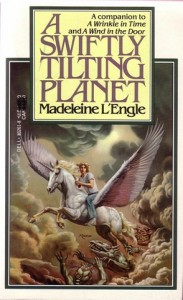
Tags: books, children's books, writing
Posted in Children's Books, Writing | No Comments »
Tuesday, September 8th, 2015
Alice in Wonderland (1865) is 150 years old. The book and its sequel, Through the Looking Glass (1871), by Lewis Carroll, were the first children’s novels to create a complete fantasy world. Before Alice, children’s books were mostly moralistic or religious, with titles such as ‘An Exact Account of the Conversion, Holy Lives and Joyful Deaths of Several Young Children’. The Alice books are infused with word play, parody of Victorian society, anarchy, and creepy characters (courtesy of Tenniel’s illustrations; the sheep below is my favourite). Alice revolutionized children’s literature.
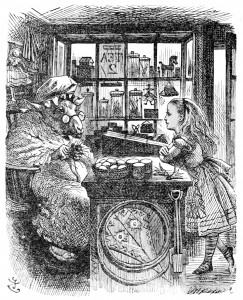 Best Alice versions:
Best Alice versions:
- The lovely hardback version with Zadie Smith’s intro and Mervyn Peake’s pictures.
- The Annotated Alice by Martin Gardner is the definitive geek’s guide.
Tags: books, children's books, classics
Posted in Children's Books | No Comments »
Friday, July 24th, 2015
Two war memoirs I was gripped by recently. Resistance by Agnes Humbert tells of her four year imprisonment by the Nazis. The title refers not only to the French Resistance but also the inner strength that enabled Humbert to survive horrific treatment. It’s a riveting read which shows ‘how the human mind can preserve the heart and soul intact against all attempts to annihilate it’ (Linda Grant).
A Moment of War by Laurie Lee relates his time in the Spanish Civil War. Lee begins his journey as an idealistic young man and ends it a shattering ‘moment’ when he sees the true consequences of war. An honest, eloquent book; the third in Lee’s stunning memoir-trilogy (with Cider With Rosie and As I Walked Out One Midsummer Morning).
‘I was in that flush of youth that never doubts self-survival, that idiot belief in luck and a uniquely charmed life, without which illusion few wars would be possible’ – Laurie Lee
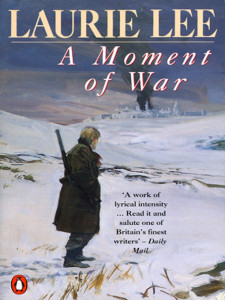
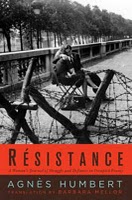
Tags: books, Peace
Posted in Peace | No Comments »
Sunday, May 10th, 2015
Antoine de Saint-Exupéry (1940) is best loved for his exquisite fable The Little Prince, but he also wrote one of the greatest true adventures, Wind, Sand and Stars (1940), an exciting poetic, philosophical memoir. Saint-Exupéry’s flights in the 1920s and 30s took him across the Pyrenees, Andes, and the Sahara in a tiny plane that would sometimes conk-out “with a great rattle like the crash of crockery.” There are remarkable descriptions of flying among waterspouts in a typhoon and his survival after a crash in the desert (which inspired The Little Prince).
In the sky a thousand stars are magnetized, and I lie glued by the swing of the planet to the sand. A different weight brings me back to myself…Behind all seen things lies something vaster; everything is but a path, a portal or a window opening on something other than itself.
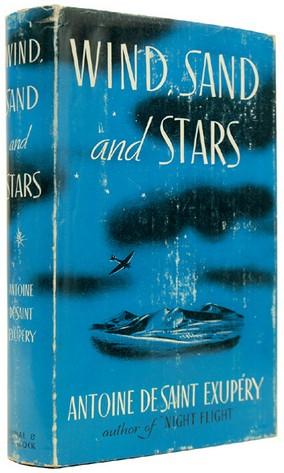
Tags: books, reviews
Posted in Book Reviews | 3 Comments »
Sunday, February 8th, 2015
One evening, a Sufi stopped by the roadside to read a book. He lit a bright lamp then walked some distance away and lit a small candle. He sat by the candle and read. People passing by asked, “Why don’t you read by the lamp?” The Sufi replied, “The bright lamp attracts all the moths. Here I can read my book in peace.” (Adapted from A Perfumed Scorpion by Idries Shah)
Blockbuster books attract many readers, but I’m attracted by books that are almost forgotten. Here are a few favourite hidden gems:
- Till We Have Faces by C. S. Lewis retells the myth of Cupid and Psyche; and which Lewis called “far and away the best of my books.”
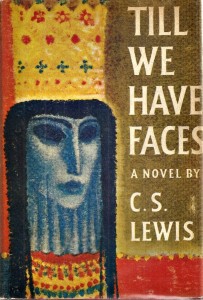
- Catastrophe, the strange stories of Dino Buzzati – a brilliant collection of surreal stories.
- Daydreamer by Ian McEwan – imaginative stories about a boy who daydreams to cope with growing up.
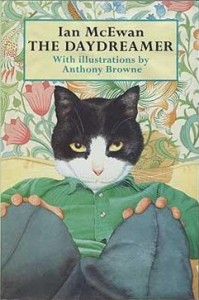
- The Importance of Living, by Lin Yutang – thoughts on everything by a Chinese writer and inventor
- Drift by William Mayne – survival story about a North American Indian girl and a white boy.
Tags: books, Reading, reviews
Posted in Book Reviews | No Comments »
Sunday, February 1st, 2015
A Bee in a Cathedral by Joel Levy is a fascinating book of science analogies and astonishing numbers. Suitable for all ages, only the physics section is a bit complex. A few of my favourites factoids:
- Every day 1 million meteoroids strike the Earth
- How far to the nearest star, Proxima Centauri? Travelling in a rocket at 250,000km/h, it would take you 18,000 years
- Most of the living cells in your body are less than a month old
- About 50 million neutrinos are passing through you now
- Every molecule in a glass of water is changing partners billions of times a second.
- How hard does your heart pump blood? Empty a bathtub in 15 minutes using only a teacup —repeat this without stopping for the rest of your life
- If an atom were blown up to the size of a cathedral, the nucleus would be no larger than a bee buzzing about in the centre.
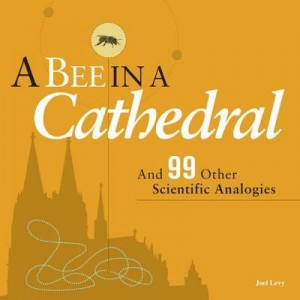
Tags: books, honey bees, reviews, science
Posted in Bees, Book Reviews, Science | No Comments »
Tuesday, April 22nd, 2014
‘There are moments, Jeeves, when one asks oneself, “Do trousers matter?”’
‘The mood will pass, sir.’
P.G. Wodehouse (WOOD-house) created a world without earthquakes, wars or dictators (except Roderick Spode whose ‘eye that could open an oyster at sixty paces’); where nothing mattered, except tidy trousers, and nothing broke, except engagements. He was a brilliant writer who cooked up similes like a master chef:
His legs wobbled like asparagus stalks.
She looked like a tomato struggling for self-expression.
Her face was shining like the seat of a bus-driver’s trousers.
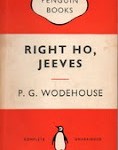 Wodehouse published 90 books, writing until his death at 93 years. When asked about his technique he said ‘I just sit at a typewriter and curse a bit’. All his books make me happy, but my favourite is Right Ho, Jeeves, about Bertie Wooster and his valet, Jeeves, who is ‘so dashed competent in every respect’. The chapter where Gussie Fink-Nottle presents the prizes at a private school is a great example of slow-building comedy.
Wodehouse published 90 books, writing until his death at 93 years. When asked about his technique he said ‘I just sit at a typewriter and curse a bit’. All his books make me happy, but my favourite is Right Ho, Jeeves, about Bertie Wooster and his valet, Jeeves, who is ‘so dashed competent in every respect’. The chapter where Gussie Fink-Nottle presents the prizes at a private school is a great example of slow-building comedy.
The sheer joy of stories which offer a world where things come right.– Sophie Ratcliffe (Wodehouse, Letters)
Read Stephen Fry’s tribute to P.G. Wodehouse.
Tags: books, humour, reviews, writers
Posted in Book Reviews, Humour, Writing | No Comments »
Thursday, February 27th, 2014
 Comics were banned in WW2 occupied France but Edmond-François Calvo secretly produced a powerful satirical comic that became a French icon after the Germans retretaed in 1944. La Bete Est Morte! is the story of the bloody European war told with Disney-style animal characters: with the French as rabbits; British bulldogs; and German wolves (Goebbels is a weasel, Himmler a skunk). La Bete Est Morte! is a forerunner of the brilliant graphic novel, Maus, with its Nazi cats and Jewish mice. Here’s an extract:
Comics were banned in WW2 occupied France but Edmond-François Calvo secretly produced a powerful satirical comic that became a French icon after the Germans retretaed in 1944. La Bete Est Morte! is the story of the bloody European war told with Disney-style animal characters: with the French as rabbits; British bulldogs; and German wolves (Goebbels is a weasel, Himmler a skunk). La Bete Est Morte! is a forerunner of the brilliant graphic novel, Maus, with its Nazi cats and Jewish mice. Here’s an extract:
My dear little children, never forget this: these Wolves who perpetrated these horrors were ordinary Wolves … They were not in the heat of battle excited by the smell of powder. They were not tormented by hunger. They did not have to defend themselves, nor to take vengeance for a victim of their own. They had simply received the order to kill.
Tags: books, children's books, comics
Posted in Book Reviews, Children's Books | No Comments »
Monday, December 23rd, 2013
A book whose small, huge work is the healing of the divisions between the child state and the adult state; of a child-sized truth about how things connect. – Ali Smith
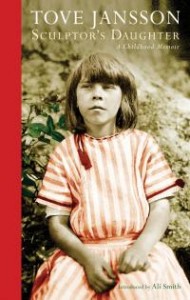 The Christmas present I couldn’t resist opening early: Sculptor’s Daughter by Tove Jansson is a beautifully written childhood memoir that reads more like short stories. Jansson was the creator of the charming Moomin books had a Moomin-like family: affectionate, creative, and liberal. Her parents were well known Finnish artists: her father a sculptor, her mother an illustrator. She spent much of her childhood on the Pellinki islands in the Gulf of Finland. This new edition of the 1968 book is an exquisite little hardback.
The Christmas present I couldn’t resist opening early: Sculptor’s Daughter by Tove Jansson is a beautifully written childhood memoir that reads more like short stories. Jansson was the creator of the charming Moomin books had a Moomin-like family: affectionate, creative, and liberal. Her parents were well known Finnish artists: her father a sculptor, her mother an illustrator. She spent much of her childhood on the Pellinki islands in the Gulf of Finland. This new edition of the 1968 book is an exquisite little hardback.
Tags: books, moomins, reviews, writers
Posted in Book Reviews | No Comments »
Thursday, October 17th, 2013
Honey, Nature’s Golden Healer by Gloria Havenhand is a superb book that deftly balances bee science, beekeeping expertise, folklore and health tips. Honey is more than just another spread for your toast:
‘Most people know very little about honey and its healing powers… Research has shown honey deserves to move into the serious league for healing.’
I thought I knew every fascinating fact about honey but I found many new insights here:
- Beeswax is made by bees only 10 to 18 days old who consume about 10 kg of honey to make 1 kg of wax.
- A little honey before bedtime fuels the brain overnight because the live stores the sugar (fructose).
- Raw honey is best to eat. Most supermarket honey is treated which removes vitamins, anti-bacterials and pollen nutrients.
- Always scrape out the honey jar – that last 1/10 of teaspoon represents the honey collected by one bee in her entire lifetime.
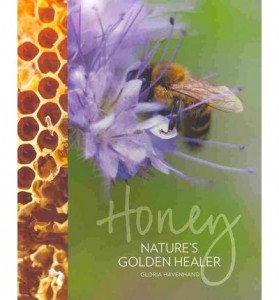
Tags: books, honey bees, reviews
Posted in Bees, Book Reviews | No Comments »
Sunday, August 11th, 2013
There’s a real tenderness and occasional profundity stitched into them. – Helen Brown (Telegraph)
It shouldn’t work but it does. Classic novels including War and Peace, Pride and Prejudice and Oliver Twist as board books for babies. Each book is cleverly condensed into twelve words suitable for very young children. The secret is in the charming photographs which tell the story with hand-made felt dolls posed in famous scenes from the novels (not the gruesome bits). The books are simple, funny and will appeal to adults as much as children. The series is Cozy Classics.
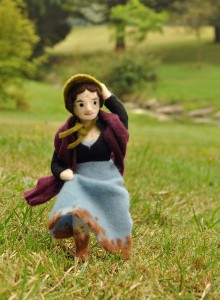 Picture 1: Elizabeth Bennett gets muddy on the way to Netherfield.
Picture 1: Elizabeth Bennett gets muddy on the way to Netherfield.
Picture 2: Andrei and Natasha dance; Pierre is jealous.
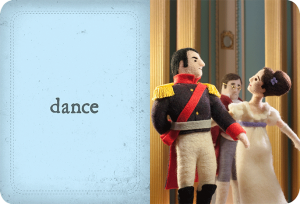
Tags: books, children's books, reviews
Posted in Book Reviews, Children's Books | No Comments »
Saturday, May 4th, 2013
Three neglected science fiction books by New Zealand writers:
The Red Dust by Bee Baldwin (1965) is one of the first NZ post-apocalyptic novels. A deadly red dust released by Antarctic drilling wipes out much of the world. A group of immunes must survive roaming gangs and a mastermind who wants to rule New Zealand. It’s a chilling, well-structured story, with great use of NZ settings (this adult novel was inexplicably in my primary school library where I read it at age 10 and understood about 10%).
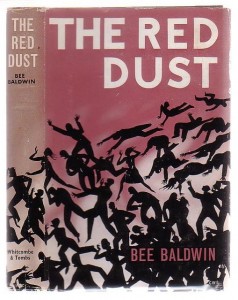
The Unquiet by Carolyn McCurdie is a strikingly original intermediate novel and a suspenseful read. It has an apocalyptic opening when the planet Pluto and parts of the Earth’s surface vanish. A small town girl has a gift for sensing unrest in the fabric of the universe and becomes the focus in a battle as the novel turns into a fantasy.
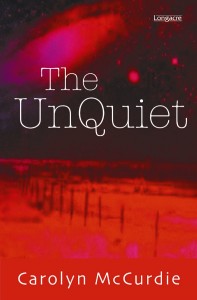
Where All Things End by David Hill describes a spectacular journey into a Black Hole. A mission to study the hole goes wrong and the crew race towards the Singularity- a point where all things become no-things. A ripping yarn underpinned by a convincing depiction of space travel and universal theories.
Tags: books, reviews, science fiction
Posted in Book Reviews, Sci-Fi | No Comments »
Sunday, January 6th, 2013
Why Does The World Exist? by Jim Holt is a fascinating book that asks the question, ‘Why is there something rather than nothing?’ Holt looks at all sides of the question, interviewing scientists, philosophers, atheists and believers (Richard Swinburne, John Irving, Roger Penrose, Adolf Grunbaum…). There are three types of theorist:
The “optimists” hold that there has to be a reason for the world’s existence and that we may well discover it. The “pessimists” believe that there might be a reason for the world’s existence but that we’ll never know for sure… Finally, the “rejectionists” persist in believing that there can’t be a reason for the world’s existence, and hence that the very question is meaningless.
Leibniz’s Principle of Sufficient Reason says that ‘For every thing there must be a reason for that thing’s existence‘, which is the basis of our scientific worldview. Holt does a good job of summarizing some knotty philosophy, physics and maths (understanding it is another matter!). Although he offers no firm answers, the book left me feeling “optimistic”; and it’s oddly comforting that after picking the brains of the world’s greatest thinkers, Holt concludes,
No one can confidently claim intellectual superiority in the face of the mystery of existence.

Photo: Solar eruption, Dec 31, 2012 – courtesy of NASA Images
Tags: books, connections, reviews, science, Universe
Posted in Book Reviews, Science, Universe | No Comments »
Thursday, December 13th, 2012
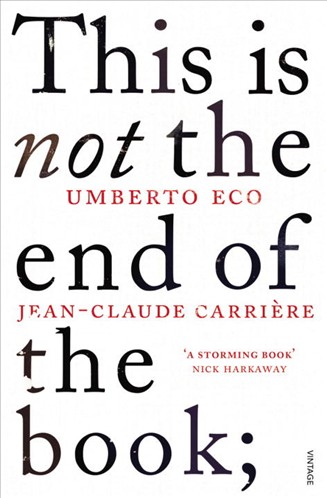 This is not the end of the book is a fascinating conversation between two great bibliophiles, the author Umberto Eco and film-maker, Jean-Claude Carriere. They discuss the history of the physical book and our digital future. It’s a rambling, wide-ranging conversation (as the best are) and the enthusiasm of these book lovers swept me along. And there’s an especially fine chapter on book censorship.
This is not the end of the book is a fascinating conversation between two great bibliophiles, the author Umberto Eco and film-maker, Jean-Claude Carriere. They discuss the history of the physical book and our digital future. It’s a rambling, wide-ranging conversation (as the best are) and the enthusiasm of these book lovers swept me along. And there’s an especially fine chapter on book censorship.
The Internet has returned us to the alphabet … From now on, everyone has to read… Alterations to the book-as-object have modified neither its function nor its grammar for more than 500 years. The book is like the spoon, scissors, the hammer, the wheel. Once invented, it cannot be improved.’ – Umberto Eco
Tags: books, Reading, reviews
Posted in Book Reviews, Reading | No Comments »
















 It’s a myth (turned cliche) that science and faith have always been at odds. The book, God’s Philosophers: How the Medieval World Laid the Foundations of Modern Science by James Hannam, shows how the church supported the genesis of science. Medieval universities were church-sponsored and ‘natural philosophy’ (as science was called back then) was a core subject. European thinkers drew on ancient Greek and Islamic texts to develop scientific principles that we still use today. Hannam debunks the myth of the ‘Dark Ages’: for example, people knew the Earth was round; the Christian church did not routinely persecute scientists; there were many inventions, from clocks to spectacles; and early Islamic scientists discovered how the eye functions and invented surgical instruments. (
It’s a myth (turned cliche) that science and faith have always been at odds. The book, God’s Philosophers: How the Medieval World Laid the Foundations of Modern Science by James Hannam, shows how the church supported the genesis of science. Medieval universities were church-sponsored and ‘natural philosophy’ (as science was called back then) was a core subject. European thinkers drew on ancient Greek and Islamic texts to develop scientific principles that we still use today. Hannam debunks the myth of the ‘Dark Ages’: for example, people knew the Earth was round; the Christian church did not routinely persecute scientists; there were many inventions, from clocks to spectacles; and early Islamic scientists discovered how the eye functions and invented surgical instruments. (

















